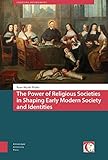The Power of Religious Societies in Shaping Early Modern Society and Identities / Rose-Marie Peake.
Material type: TextSeries: Crossing Boundaries: Turku Medieval and Early Modern Studies ; 12Publisher: Amsterdam : Amsterdam University Press, [2020]Copyright date: ©2020Description: 1 online resource (246 p.)Content type:
TextSeries: Crossing Boundaries: Turku Medieval and Early Modern Studies ; 12Publisher: Amsterdam : Amsterdam University Press, [2020]Copyright date: ©2020Description: 1 online resource (246 p.)Content type: - 9789048537976
- 271.91 23
- BX4463.F8 P43 2020 (Online)
- online - DeGruyter
| Item type | Current library | Call number | URL | Status | Notes | Barcode | |
|---|---|---|---|---|---|---|---|
 eBook
eBook
|
Biblioteca "Angelicum" Pont. Univ. S.Tommaso d'Aquino Nuvola online | online - DeGruyter (Browse shelf(Opens below)) | Online access | Not for loan (Accesso limitato) | Accesso per gli utenti autorizzati / Access for authorized users | (dgr)9789048537976 |
Frontmatter -- Table of Contents -- Acknowledgements -- Three Worlds, Three Portraits: Introduction -- 1. At the Cradle: Gender and Power in Seventeenth-century Parisian Society -- 2. Portrait of Louise de Marillac: Ensuring Resources for Moral Management -- 3. Portrait of the Daughter of Charity: Safeguarding the Execution of Moral Management -- 4. Portrait of the Underprivileged: Managing the Ignorant Substitute of Christ -- From Conservative Moral Management to Survival: Conclusions -- Sources -- Note on Vocabulary -- Index
restricted access online access with authorization star
http://purl.org/coar/access_right/c_16ec
The Power of Religious Societies in Shaping Early Modern Society and Identities studies the value system of the French Catholic community the Filles de la Charité, or the Daughters of Charity, in the first half of the seventeenth century. An analysis of the activities aimed at edifying morality in the different strata of society revealed a Christian anthropology with strong links to medieval traditions. The book argues that this was an important survival strategy for the Company with a disconcerting religious identity: the non-cloistered lifestyle of its members engaged in charity work had been made unlawful in the Council of Trent. Moreover, the directors Louise de Marillac and Vincent de Paul also had to find ways to curtail internal resistance as the sisters rebelled in quest of a more contemplative and enclosed vocation.
Mode of access: Internet via World Wide Web.
In English.
Description based on online resource; title from PDF title page (publisher's Web site, viewed 02. Mrz 2022)


